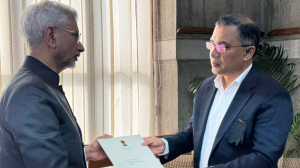Shanghai protests
When South Delhi resident associations organise against the Metro line...

When South Delhi resident associations organise against the Metro line, it barely makes news beyond the Indian capital. For obvious reasons, it is an international story when Shanghai8217;s citizens protest against extending a train line through their neighbourhood.
For nearly three weeks now, Shanghai has seen rare protests by local communities against the city8217;s show case project, the ultra-fast MagLev line using the German technology of magnetic levitation, that connects the airport in Pudong to the heart of the city. Some observers see this as part of a growing assertiveness of China8217;s urban middle classes, a potential political trend-setter from Shanghai that is at the heart of modern China8217;s political history.
To be sure, the protest is apolitical. The demonstrations are not questioning the legitimacy of the government. What they want is greater say on issues that directly affect their lives. Despite the very local 8216;not in my backyard8217; nature of the protests, the Chinese Communist Party is concerned at the deeper implications of bold citizen initiatives.
The CCP8217;s paper in Shanghai, 8216;Jiefang Daily8217;, condemned what it called 8220;street politics8221; in a recent editorial. The daily argued that these protests 8220;could only damage the stable foundation of the 8216;harmonious society8217; and this kind of trend must be prevented. This kind of behaviour is illegal and damages public interest, so we need to be clearheaded and firmly against it.8221; 8216;Harmonious Society8217; is a reference to President Hu Jintao8217;s emphasis on the need to manage the newly emerging political and tensions in a rapidly developing China.
Initially cautious, the police broke up the second round of protests ten days ago. The civic authorities in Shanghai say they are quite open to hear out those objecting to the route of the MagLev line; but the protestors want more than a formal consultation.
The activism in Shanghai has stuck a chord with a range of groups around China, who have been using the internet to spread the word and post pictures of the protest on the 8216;You Tube8217;.
Unlike in India, local governments in China have extraordinary powers to implement projects. Once a decision is taken, the project managers are free to acquire land or displace people. At least until now. The last few years have seen growing protests in the Chinese countryside against land grab by sharp businessmen in collaboration with party and government officials.
It now seems to be the turn of the urban middle classes. They are ready to zealously guard their newly acquired possessions and are not prepared see the value of their properties go down because of government8217;s decisions on public projects.
Afghan copper
Beijing8217;s economic profile in Afghanistan is set to rise dramatically, as a Chinese state-owned company closes in on a deal to acquire one of the world8217;s largest copper deposits at Aynak, 40 km southeast of Kabul.
When the US 3 bn dollar investment by the China Metallurgical Group goes through, it will represent more than a third of all the international aid that has flown into Afghanistan after the ouster of the Taliban. The Afghan government is expected to rake in annual royalties of nearly US 400 mn, which is nearly 40 per cent of its budget in 2006.
Late last year, the Chinese beat eight other international companies to become the preferred bidder for the Aynak field. This could be the first step in a risky move by Beijing to dig deep into Afghanistan. If the project succeeds, it could attract additional foreign capital for the development of Afghanistan8217;s under-explored but vast mineral resources.
Space power
After its anti-satellite test in January 2007 drew international condemnation, China is trying to show some transparency this year. Earlier this month, Chinese authorities have outlined the plans for space activities during 2008. China8217;s space activity in 2007 was capped by the launch of the first lunar probe last November. This year will see the first space walk by a Chinese astronaut. Besides the manned spaceship, China hopes to launch 15 rockets and deploy 17 satellites in 2008.
The writer is professor at the S. Rajaratnam School of International Studies, Nanyang Technological University, Singapore iscrmohanntu.edu.sg
- 01
- 02
- 03
- 04
- 05































